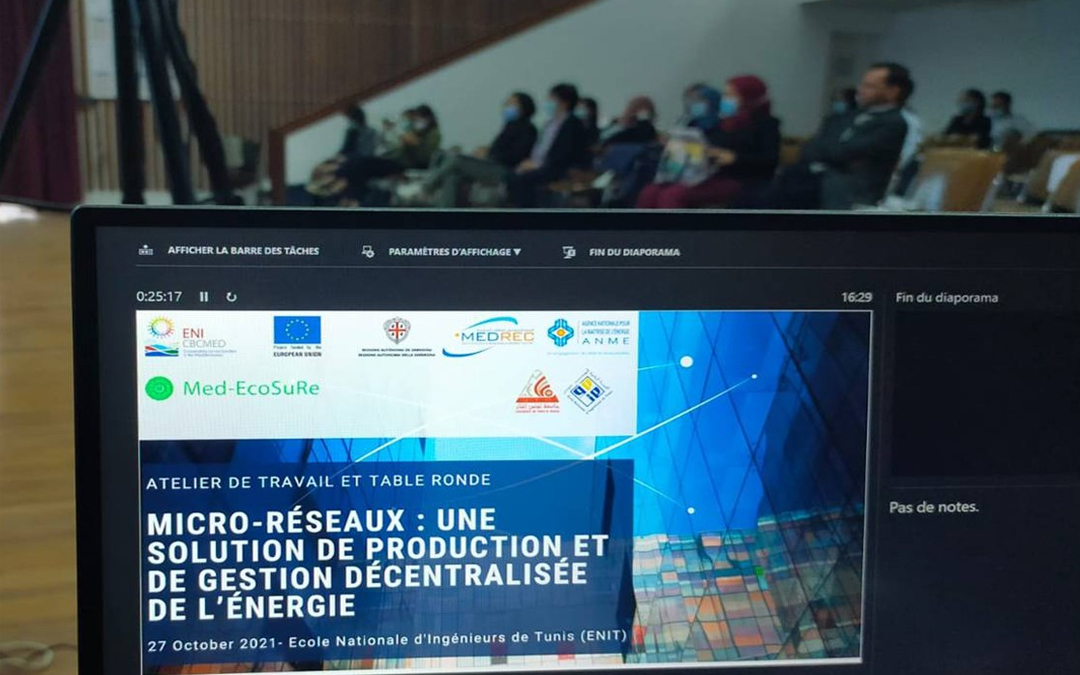On October 27, 2021, MEDREC (Mediterranean Renewable Energy Center) and ENIT (National School of Engineers of Tunis) brought together Mediterranean decision-makers, academics, and private companies, as well as initiatives such as the Interreg MED Renewable Energy Community (S Energy and SUNREF Finance) for a workshop on “Microgrids as Decentralized Energy Production and Management Solutions.”

This workshop was organized to explore the scaling potential of a microgrid platform equipped with an energy management system and powered by photovoltaic panels, implemented within Med-EcoSuRe, called SMARTNESS (Smart Micro Grid Platform with an Energy Management System) which is a demonstration and research platform for:

The hybrid workshop program included:
Conferences: during which best practices for implementing microgrids in the Mediterranean context were shared. For example, the PEGASUS project, funded under the Interreg MED program, was presented, which aims to implement a set of tools and measures to facilitate the development of microgrids. In addition, the design and technical framework for the development and implementation of microgrid projects as a form of decentralized energy production were presented by various organizations, including the CITCEA Research and Technology Transfer Center, part of the Universidad Politècnica de Catalunya (UPC), which specializes in power electronics and its applications.
A roundtable involving decision-makers and key stakeholders, which was very dynamic and included joint discussions on “Opportunities and Challenges for the Development of Decentralized Energy Production”, with a particular focus on microgrids, which allowed participants to explore in-depth knowledge related to the technical and legal framework of decentralized energy production. Below is a summary of the roundtable’s Q&A session:
Speaker 1. Arbre Dhouha
Head of the Energy Efficiency and Network Quality Department,
Technology/Research and Innovation Department of STEG (Tunisian Electricity and Gas Company)
Q. To meet the growing demand for electricity and maintain power quality, to what extent will STEG opt for a local microgrid project?
A. STEG launched an ambitious program today to integrate renewable energy into the national energy mix. The challenges are mainly related to decentralized energy production from intermittent renewable sources and the new automotive market developing in Tunisia, leading to increased demand.
We are interested in two types of microgrids: The first is primarily the “smart grid,” which is simply a kind of modernization of the national grid through pilot projects including the installation of smart meters like the one in Sfax. The second type is a conventional microgrid that will be tested in Karkenah to reduce the region’s theoretical electricity capacity.
Speaker 2. Cléo Fulchiron
SUNREF-Tunisia Program Coordinator
Q. What financing mechanisms does the SUNREF program offer to the private sector to help promote decentralized energy production and self-consumption projects in Tunisia?
A. In addition to traditional solar installation projects, the SUNREF program finances feasibility studies for innovative projects led by SMEs (Small and Medium Enterprises), while always taking into account the sometimes restrictive legislative framework. One example is an entrepreneur in the agricultural sector wishing to install a PV (Photovoltaic) power plant that supplies several sites and types of electricity, including agricultural buildings and housing.
The SUNREF program has made significant efforts in training and technical support to banks for the review and evaluation of financing applications submitted by companies to the program.
Speaker 3. Mohamed Ali Gam
Vice President of the Tunisian Cluster for Renewable Energy and Energy Efficiency (TuniCREEE)
T1. What role does the TuniCREEE cluster play in strengthening local businesses so they can innovate and adapt to new markets for decentralized energy production?
R1. The TuniCREEE cluster was formed as a group of Tunisian companies operating in the renewable energy sector to create synergies, explore high-potential markets, and export Tunisian expertise in the field.
Regarding microgrids, I am fully convinced that significant potential exists today, particularly in the agricultural sector. A configuration similar to SMARTNESS is very attractive for Agricultural Development Groups, some of which are already committed to the idea and are participating in the development of future projects.
Q2. In Tunisia, farmers have the option of implementing their own solar systems. In this case, why would they opt for microgrids? It’s also important to consider the issue of pooling and co-ownership.
A2. In such projects, we consider that part of the financing is supported by the Agricultural Development Groups and another part is supported individually. The financial risk is thus shared between the group and the individuals. Technically, a pooled installation is optimized in terms of installation capacity and operation.
Speaker 4. Mehdi Kallel
Head of Industrial Batteries Division – ASSAD Group
Q. What are the needs for technological testing platforms to support the technological development of energy storage systems in Tunisia, in order to prepare local manufacturers for the growing demand for these systems?
A. The R. ASSAD Group has been working in this field since the early 1980s, with a pilot project that installed 3,000 stand-alone photovoltaic street lighting stations.
The group is currently adapting to technological developments in the market, focusing on lithium batteries. We have signed partnership agreements with universities for research projects (doctoral theses), and recently with ACTIA and TuniCREEE, and we are open to all collaborations to further develop this field.

The workshop concluded with a visit to the SMARTNESS Micro-Grid pilot project at ENIT’s Electrical Engineering Department. A guided tour of the platform is available HERE.
Through the implementation and expansion of the SMARTNESS platform, the Med-EcoSuRe project aims to promote, in collaboration with Mediterranean initiatives and projects, innovative technologies and concepts for the production and distribution of decentralized electrical energy, in the Mediterranean context and particularly in Tunisia, where the integration of such technologies is an urgent necessity!

